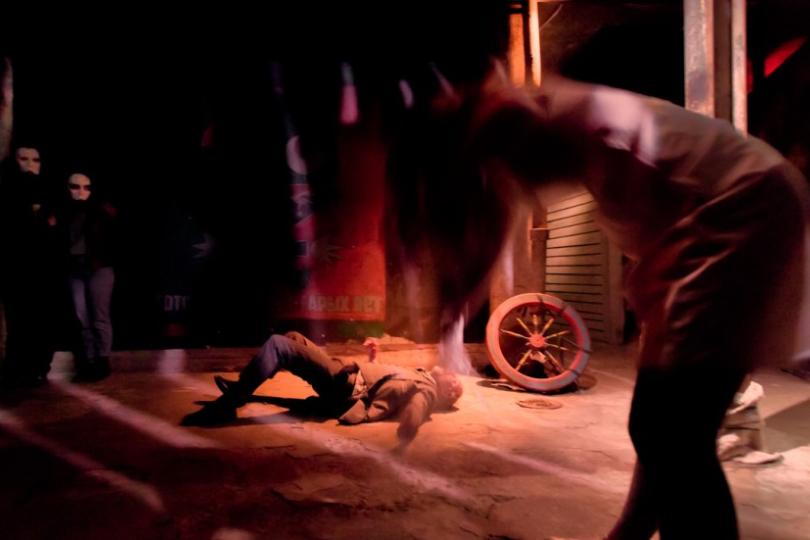Are you guilty?

A few minutes into Crime and Punishment, a desperate young woman asked me to help her find her laundry. I gave her a small smile, shrugged and wandered away. Twenty minutes later she was lying dead on a filthy carpet.
I feel like a jerk.
And that's sort of the point of Crime and Punishment, a co-presentation of Live Action Set, Dangerous Productions and The Soap Factory.
Not that the dozens of performers, designers, crew members and volunteers involved with Crime and Punishment want you to feel badly about yourself, but they do want you to feel involved.
We live in a glorious time for entertainment. YouTube, Hulu, Netflix, etc. have world-jigglingly changed how we receive stories. Movies and TV shows that cost millions of dollars to make now come zipping straight to my little tablet. I can watch in any room of my house, any time I want. I can start and stop as I choose, pause to fix a sandwich, skip back if I miss something. It's so convenient!
Theater is not.
So the poor, wan souls who grub around in the super inconvenient world of theater need to ask themselves what they can offer an audience that they can't get anywhere else.
Live Action Set, et al., serve up Crime and Punishment as one possible answer. And they offer it with a big, bold shout.
This is a performance that can't exist without an audience. I know, I know, every theater says that, but much of the time, that's only sort of true. Often the only space left for the audience are pauses in which you are allowed to laugh or clap. Here, the need for an audience is a feverish, vodka-soaked fact.
Welcome to the Jungle
You put on a mask(!) and descend into a sort-of representation of a St. Petersburg slum. Everyone is poor. Everyone lives on top of everyone else. It's a hard place to keep secrets. The pleasures-- booze, drugs, prostitution--are ugly. Every humiliation is public. And everyone down here - street vendors selling shoes or religious icons, students, cops, pawnbrokers, you, me--everyone has the potential to suffer and cause suffering in others.
You see a young man weeping alone in his cramped study, later you see him sneering at a passing drunk. You discover the pimp with the permanent smirk from earlier now bleeding and horrified. An overworked policeman tries to get at the truth while hurling abuse at everyone who crosses his path.
You, not allowed to speak but free to explore, become a part of this world. Your fellow audience members, masked like you, appear in doorways and shuffle around corners. At first you find yourself judging them for their silence and stubborn impotence. Then you realize you are one of them.
Little notebooks dangle from strings throughout the performance area. They are diaries belonging to the inhabitants. At least, I think that's what they are. I stopped reading when I found they were some person's innermost thoughts.
Yet, despite my good Midwestern sense of decorum, within moments of putting down the notebook, I was watching a family being thrown out of their home. There I was with my stupid mask pressing my glasses into my face, trying to stay out of the way of crass furniture movers while a tall man in a funny hat had the lowest moment of his life. The first victim of poverty is dignity.
It's not fun, exactly, but it's pretty great.
There is a narrative to Crime and Punishment and the production will guide you through the story if you choose to follow. The sound of chimes lets you know something is about to go down. You head toward the sound of raised voices. Or three people go rushing by you; you follow and stumble into a crime scene. Or a pair of hands gently lead you to a cramped living room where things get pretty weird.
There is also the world to explore away from the action. You will want to both attend to the story and wander off alone. But in whatever way you parcel out your attention, you can't escape feeling involved. Complicit. It's not fun, exactly, but it's pretty great. You don't get that binge watching Iron Chef America.
Not all theater needs to be like this, but some theater has to be like this. With most plays, you walk out of the theater thinking that was good, or that was awful, I wonder what I'll eat when I get home. This show changes that. I mean, I know it was a play and those were just characters, and the actors, I'm sure, are all very nice and probably doing just fine, but by making me stand there in the middle of all that, a mute witness, unable to help, I walk out not just judging the performance elements, but judging myself.
Sadly
Having made me feel these things, I'm not sure what the creators of Crime and Punishment want me to do next. They don't say. As I write this, the death toll in Nepal has reached 2,500 and is expected to keep rising. And while the immediate cause of so much death is an earthquake, it is poverty that made so many people so vulnerable. Will I stand by silently and do nothing? Probably. I know myself. I'm an asshole and I have eight more episodes of Daredevil to watch.
And maybe that's the real lesson here. When shaken by a bit of very inconvenient theater like Crime and Punishment you can always turn to Netflix. Because the one thing greater than our inexhaustible supply of human suffering, is our ability to ignore human suffering.


